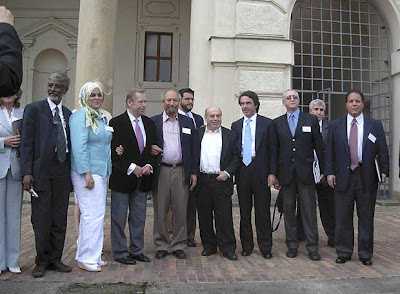Ayer y hoy se ha celebrado en la República Checa una cumbre mundial de disidentes. En la bella ciudad checa se han reunido convocados por Havel, Sharansky y Aznar, disidentes de todas las tiranías del mundo.
He asistido a la conferencia en lugar de los disidentes cubanos, cientos, a los que el gobierno no permite salir del país, y ayer tuve la suerte de ser recibido, junto a una veintena de disidentes de todo el mundo, con el Presidente Bush. Fue una impresión muy grande tener tan cerca a un personaje así, me sorprendió su cercanía, su interés por las personas y los problemas de los allí presentes, su dedicación, era como si no tuviera prisa, se hacía fotos con cualquiera que se lo pidiera, bromeaba, tomaba notas… chapeau
Hoy he tenido el honor de intervenir en un diálogo entre los organizadores y ocho disidentes en representación de todo el mundo. Copio mi intervención:
Dissidents in Cuba
As someone pointed out yesterday, I’m not a dissident either. I’m here because, unfortunately, the Cuban government yet again has not allowed any of the Cuban democratic leaders to attend. These leaders are either in jail or are prohibited from leaving the country…they are prisoners of a larger prison.
After 47 years, Cuban dissidence has had time to pass through all the phases that dissidents normally experience. All are terrible: persecution, prison, discredit…but perhaps the most painful is oblivion.
Castro’s regime discovered many years ago that the best way to weaken the strength of a democratic movement within Cuba was to act as though it did not exist, to ignore it. As if the dissidents were no more than a social anomaly, strangers living outside their land, outside their time.
Isolating dissidents causes them to feel different and to suffer the punishment of solitude on a daily basis. The slow passage of time wears down their hope and causes them to frequently question whether their battle has meaning.
There are many people around them who would like to approach them and tell them, although in a whisper, that they are on their side, that they are of the same school, but they cannot. The future of their families, their children’s education, their wives’ jobs, all this and more is at risk….
Citizens who live in democratic societies have the obligation to fulfil this role. To accompany the democrats, listen to them, give them voice, support them economically, continually pass on the spirit of freedom, to shout as loudly as possible to them, so that all of their neighbours hear, that they are not alone. This is how we will protect them from persecution, favour their liberation, strengthen their prestige and, above all, begin to give them a place of their own without having to wait, as was the case before, for history to do so.

